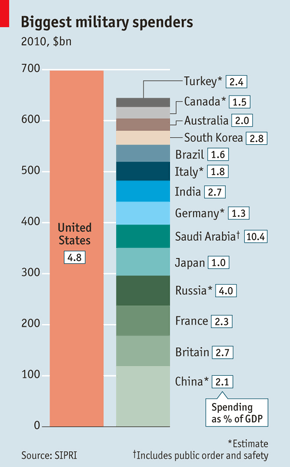Europe is not stupid about its defense spending.
Since I entered government 45 years ago, Iâ??ve shifted my views and changed my mind on a good many things as circumstances, new information, or logic dictated. But I have yet to see evidence that would dissuade me from this fundamental belief: that America does have a special position and set of responsibilities on this planet. I share Winston Churchillâ??s belief that â??the price of greatness is responsibilityâ?¦[and] the people of the United States cannot escape world responsibility.â? This status provides enormous benefits â?? for allies, partners, and others abroad to be sure, but in the final analysis the greatest beneficiaries are the American people, in terms of our security, our prosperity, and our freedom. - Robert Gates, May 24, 2011â??The blunt reality is that there will be dwindling appetite and patience in the U.S. Congress â?? and in the American body politic writ large â?? to expend increasingly precious funds on behalf of nations that are apparently unwilling to devote the necessary resources or make the necessary changes to be serious and capable partners in their own defense,â? Mr. Gates said. - Robert Gates, June 10, 2011
This double-message is the reason that Washington is so often frustrated with Europe's unwillingness to pony up. On the one hand, there's the presumption in Gates' first quote: that America must sustain military capabilities far in excess of what's required for the defense of the United States and her commercial interests to sustain "global leadership" (as defined by bombing countries like Libya). On the other, there's a frustration that other countries are listening to America and budgeting accordingly. But what else are they supposed to do?

The fact of the matter is that Europe understands perfectly what's going on. The U.S. has a view of European security that insists that America play a "leading" role. The U.S. spends enormous sums on its military and has defined the NATO alliance as its central organizing principle for European security. That, combined with a more much benign security environment (and a much more precarious economic environment) for most European states leads inexorably to defense budget cuts and allies "not pulling their weight."
Why we have to have the spectacle of senior American policy makers acting shocked, shocked! about this outcome is beyond me.
Update: Larison keys in on a more practical problem:
It may be obvious, but Gatesâ?? two examples of non-U.S. NATO failings have nothing to do with European defense. Certainly, the limitations of European military power show that their governments remain dependent on the U.S. for security, but there are few worse ways to persuade European governments and publics that they have the wrong priorities than to lecture them on their insufficient support for Afghanistan and Libya. While the non-U.S. NATO allies pledged support to the U.S. after 9/11, European nations have no particular security interests in achieving U.S. goals in Afghanistan. If the American public has soured on the war in Afghanistan and doesnâ??t understand its purpose, imagine how baffling it must be to Europeans to have their soldiers in Central Asia. European governments have continued to support the war in Afghanistan long after they were obliged to do so, and despite lending support that they donâ??t have to provide they are routinely lectured for not doing enough.As for Libya, it is important to remember that the governments that have contributed nothing to the war never wanted to attack Libya, and they wanted to keep NATO out of it all together. Gates directed his ire at several of these governments the other day, as if Germany, Poland, and Turkey should be expected to pitch in to support a military campaign they explicitly opposed.
Very true.



